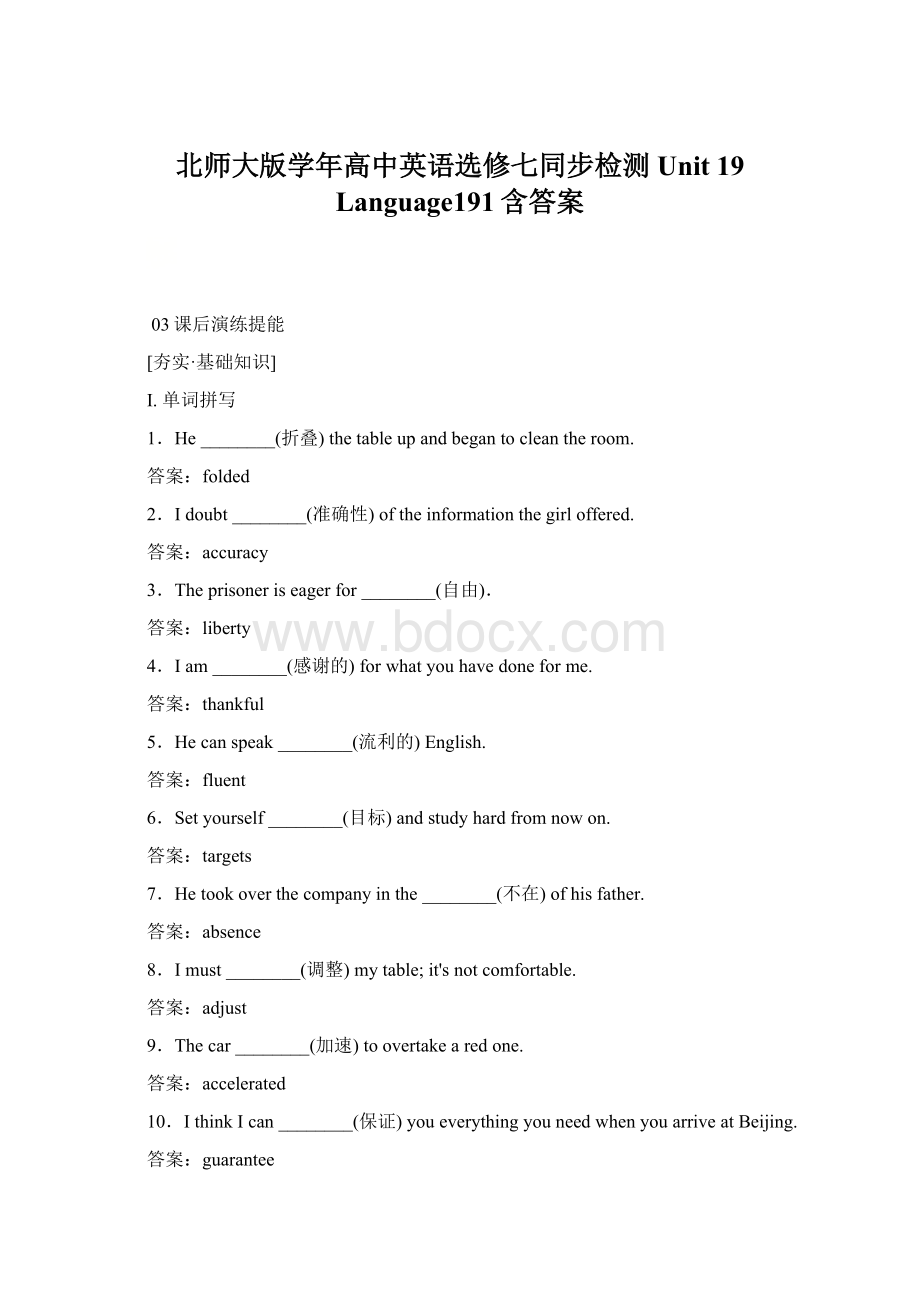北师大版学年高中英语选修七同步检测Unit 19 Language191含答案.docx
《北师大版学年高中英语选修七同步检测Unit 19 Language191含答案.docx》由会员分享,可在线阅读,更多相关《北师大版学年高中英语选修七同步检测Unit 19 Language191含答案.docx(11页珍藏版)》请在冰豆网上搜索。

北师大版学年高中英语选修七同步检测Unit19Language191含答案
03课后演练提能
[夯实·基础知识]
Ⅰ.单词拼写
1.He________(折叠)thetableupandbegantocleantheroom.
答案:
folded
2.Idoubt________(准确性)oftheinformationthegirloffered.
答案:
accuracy
3.Theprisoneriseagerfor________(自由).
答案:
liberty
4.Iam________(感谢的)forwhatyouhavedoneforme.
答案:
thankful
5.Hecanspeak________(流利的)English.
答案:
fluent
6.Setyourself________(目标)andstudyhardfromnowon.
答案:
targets
7.Hetookoverthecompanyinthe________(不在)ofhisfather.
答案:
absence
8.Imust________(调整)mytable;it'snotcomfortable.
答案:
adjust
9.Thecar________(加速)toovertakearedone.
答案:
accelerated
10.IthinkIcan________(保证)youeverythingyouneedwhenyouarriveatBeijing.
答案:
guarantee
Ⅱ.选词填空
taketheformof;whether...or...;getdownto;adequatefor;ofhighquality
1.Automaticsavewillbe________almosteverybody.
答案:
adequatefor
2.Itissaidthatthetrainingthistimewill________discussionandlectures.
答案:
taketheformof
3.Thisrefrigeratoris________andisnotexpensiveeither.
答案:
ofhighquality
4.That'senoughfun!
Let's________working.
答案:
getdownto
5.Thesecretarylayawakeallnightwondering________toleave________stay.
答案:
whether;or
Ⅲ.翻译句子
1.有人预言那个地区即将发生地震。
_______________________________________________________
答案:
Itwaspredictedthatanearthquakewouldimmediatelybreakoutinthatarea.
2.现在告诉他事实是没有用的。
_______________________________________________________
答案:
There'snopoint(in)tellinghimthetruthatpresent.
3.我们队能赢得这次比赛的机会很大。
_______________________________________________________
答案:
Thechancesthatourteamcanwinthematcharegreat.
4.这就意味着我们将在雨中再等两个小时。
_______________________________________________________
答案:
Whatthismeansisthatwewillwaitforanothertwohoursintherain.
5.不管你是留还是去,我都不在乎。
_______________________________________________________
答案:
Whetheryoustayorleave,Idon'tcaremuch.
Ⅳ.单句语法填空(不多于3个单词)
1.IcanremembermychildhoodwhenI________(surround)byloveandkindness.
答案:
wassurrounded “I”与“surround”之间为被动关系,故用被动语态;结合“mychildhood”可知应用一般过去时。
2.Youcan'tseethroughthetelescopeuntilitisadjusted________youreyes.
答案:
to “adjust”调整,与介词“to”搭配使用。
句意:
直到根据你的眼睛调整好望远镜,你才能通过望远镜观看。
3.Inthe________(absent)ofproof,thepolicecouldnottakeactionagainsttheman.
答案:
absence “intheabsenceof”由于缺少……,固定短语。
句意:
由于缺少证据,警方不能对那个人采取行动。
4.Itdoesn'tmatter________youturnrightorleftatthecrossing—bothroadsleadtothepark.
答案:
whether 句意:
在十字路口无论你向右拐还是向左拐都无所谓,两条路都通往公园。
“whether...or...”无论……还是……。
5.Theimportantthinginlifeistohaveagreataim,andthedetermination________(attain)it.
答案:
toattain 不定式作定语,修饰“determination”。
句意:
人生中重要的事情就是有一个伟大的目标及实现这个目标的决心。
6.Neither________(fluent)noraccuracyiseasytocomebyinlearningaforeignlanguage.
答案:
fluency 名词形式作主语,与“accuracy”形式一致。
“fluency”n.流利度。
7.Hewasalways________fromschool,andhis________annoyedtheteacherverymuch.(absence)
答案:
absent;absence 第一个空处形容词作表语,“beabsentfrom”缺席;第二个空处形容词性物主代词后接名词形式。
8.Theoldcitywallsstill________thecityofPingyao;inotherwords,thecityofPingyaoisstill________bytheoldcitywalls.(surround)
答案:
surround;surrounded 第一个空处“Theoldcitywalls”和“surround”之间为主动关系,且叙述现在的情况,故用一般现在时;第二个空处用过去分词与“is”构成被动语态。
9.Hedevoteshistimetothe________ofknowledge;andafteryearsofhardwork,hehas________alot.(acquire)
答案:
acquisition;acquired 第一个空处,定冠词后用名词形式;第二个空处用过去分词与“has”构成现在完成时。
10.Pleasekeepus________(inform)ofyourdecisionandwewillactaccordingly.
答案:
informed “us”与“inform(告知)”之间为被动关系,故用过去分词形式作宾补。
[提升·实战能力]
Ⅴ.完形填空
MyparentstookmetoCaféMarol,asmallrestaurantnearourhomeinMumbai,fordinneronenight.Aswechatted,having__1__ourdinner,awaitercameby,watchedus__2__andleft.
Thentherestaurantownerdidthesamething.Their__3__behavior
mademymotherverynervous__4__shesuggestedweleave.However,myfatherdecidedto__5__.Justthentheownerreturned.“Didyou__6__anythingaboutayearago?
”heasked.“Yes?
”Mymotherfelt__7__.“Oh,welostagoldring.”
Oneeveningmorethanayearearlier,we'dgonetovisitmyuncle,a__8__,who'djuststartedwork.Onourwayback
we'd__9__atthisrestaurantforasnack(点心).Thenextday,asmymotherwasgettingmereadyforschool,she__10__thatthegoldringIworewas__11__.MyparentsandI__12__ourcar.Myunclechecked
thehospital,butitwasn'tthere.
“Yes,agoldring!
”therestaurantowner__13__,smiling.“Thewaiterwho__14__yourtableafteryoulefthandeditover
tome.”Theownerhadthenkeptthe__15__attherestaurantforafewdays,hopingsomebodywouldcomeforit.Whennobody__16__,SajidNedaria,theowner,tookithometo__17__it.Healsotoldthe__18__tokeepaneyeoutfor
thecustomers
whomighthavelostit.Thewaiterhadbeenfollowinghis__19__!
Wegotmygoldringbackthenextday.Myfather__20__themwarmly,andMr.Nedariasaid,“Weshouldlivewithapurpose
.”
语篇导读:
大约一年前作者和家人去餐馆吃饭时无意中丢了一枚金戒指。
一年后他们再去那家餐馆吃饭时,侍者和老板认出了他们,并将一直保存着的戒指还给了他们。
1.A.prepared B.ordered
C.broughtD.changed
答案:
B 根据第一段首句和常识可知,到餐馆吃饭应该是先点(order)菜,然后边聊天边等着上菜。
2.A.disappointedlyB.happily
C.carefullyD.proudly
答案:
C 根据下文可知,侍者怀疑作者一家就是丢失金戒指的客人,所以他仔细地(carefully)看了看他们。
3.A.strangeB.violent
C.secretD.foolish
答案:
A 侍者从作者他们的桌旁路过,仔细看了看他们,然后走了,接着餐馆老板也是如此,他们的行为很奇怪(strange)。
4.A.soB.but
C.becauseD.though
答案:
A 分析句子的逻辑关系可知,他们奇怪的行为让作者的母亲非常紧张,所以(so)她建议离开。
5.A.tryB.run
C.speakD.stay
答案:
D 根据上文中的However可知,作者的父亲却决定留下来(stay)。
6.A.buyB.lose
C.borrowD.choose
答案:
B 结合下文作者母亲的回答可知,老板问作者一家大约一年前是否“丢”过什么东西。
7.A.satisfiedB.tired
C.boredD.amazed
答案:
D 作者的母亲之前还因老板和侍者奇怪的行为感到紧张,老板问的问题让她有点惊奇,故选amazed。
8.A.lawyerB.policeman
C.teacherD.doctor
答案:
D 根据第二段末尾的“Myunclecheckedthehospital...”可推知,此处指作者的叔叔是一个刚工作的医生(doctor)。
9.A.stoppedB.talked
C.workedD.finished
答案:
A 在回家的途中,作者他们停下来,在这家餐馆吃点心。
10.A.foundB.explained
C.provedD.believed
答案:
A 第一段提到丢了金戒指,所以此处指在第二天母亲要送作者上学时,“发现”作者手上戴的戒指丢了。
11.A.differentB.missing
C.familiarD.ordinary
答案:
B 母亲发现作者戴的金戒指不见了。
“missing”找不到的,丢失的。
12.A.droveB.repaired
C.searchedD.washed
答案:
C 发现金戒指丢了之后,作者和父母在车里找了一遍,故用search。
13.A.promisedB.answered
C.repeatedD.suggested
答案:
C 第一段最后一句作者母亲提到丢了一个金戒指,所以此处指餐馆老板笑着将“一个金戒指”又重复(repeat)了一遍。
并没有人向餐馆老板提出问题,故此处不用answer。
14.A.movedB.cleaned
C.bookedD.set
答案:
B 根据常识可知,顾客用完餐之后,侍者会清理(clean)餐桌。
15.A.carB.table
C.menuD.ring
答案:
D 上文多次提到戒指丢失了,所以此处指餐馆老板把侍者交给他的戒指(ring)放在了餐馆里。
16.A.showedupB.gotoff
C.watchedoutD.playedaround
答案:
A 根据下文中的tookithome可推知,一直没有人出现(showup)在餐馆,找寻丢失的戒指。
17.A.checkB.keep
C.shareD.wear
答案:
B 没有人前来认领戒指,餐馆老板就把戒指保存(keep)在了家里。
18.A.ownerB.guest
C.waiterD.cook
答案:
C 上文提到是侍者发现了戒指,所以此处老板让“侍者”留心看着丢失戒指的顾客是否会前来。
“keepaneyeoutforsb.”留神某人。
19.A.treatmentB.argument
C.instructionD.example
答案:
C 第一段中提到侍者细心地发现了丢失戒指的客人,故他应该遵从了老板的指示(instruction)。
20.A.invitedB.accepted
C.welcomedD.thanked
答案:
D 侍者和餐馆老板一直在寻找丢失金戒指的人,所以作者的父亲非常感谢(thank)他们。
Ⅵ.阅读理解
BabySignLanguagecomesfromaverycuriousobservationthatthechildrenofdeafparentsareabletocommunicateearlierthanthechildrenofhearingparents.Thefirstknownpersontoremarkon
thisoddity
isWilliamDwightWhitney,a19thcenturyAmericanLinguist.Heremarkedonthesuperiorcommunicationabilitiesofthechildrenofthedeaf.Thesechildren,despitehavingwhatmightbeconsideredacommunicationhandicap
andparentsthatdidnotspeak,learnedtospeak.Theywerealsoobservedtobeonasimilarspeakingdevelopmentpathasthechildrenofhearingparents.Whitneydidnottakeitmuchfurtherthanthatandthiscuriositywasleftlargelyuninvestigatedformorethanacenturyuntilitwasrediscoveredinthe1970s.
Dr.JosephGarcia,thenanASLinterpreter,wasthefirsttotakethenextstep.Dr.Garcianoticedthatthechildrenofhisdeaffriendswerecommunicatingwith
theirparentsasearlyassixmonthsoldusingsignlanguageandhadsubstantial
vocabulariesasearlyasninemonthsold.
Thisisunexpectedsincemostchildrendon'tstartsayingtheirfirstfewwordsuntiltwelvemonthsoldandwillstillhaveaverysmallvocabularyattwoyearsold.
Ataroundthesametime,ProfessorLindaAcredolonoticedherdaughtermakingbasicsigns.WorkingwithherresearchpartnerattheUniversityofCalifornia(SanDiego),ProfessorSusanGoodwyn,thepairbeganteachingthebabymoresigns.Togethertheywonthefirstofaseriesof
NIHgrantstostudythephenomenon.Overthenext20yearsAcredoloandGoodwynconductedthefirstcomprehensiveBabySignLanguageresearch.Theseexperimentsshowedthetremendous
benefitsofBabySignLanguageinachild'sdevelopment.
In1998,thefirstBabySignLanguageprogramintendedfor
thechildrenofhearingparentswasconductedbyKimberleeWhaleyattheInfant�ToddlerLaboratoryatOhioStateUniversity.Infantsasyoungas9monthsoldandtheirteachersbegantolearntousesomesignsfromtheAmericanSignLanguagetocommunicatewitheachother.
语篇导读:
文章介绍了婴儿身体语言的发展历史。
Whitney最早阐述了对婴儿身体语言的看法。
之后婴儿身体语言的发展经历了不同的发展时期,直到1998年,Whaley发明了一套婴儿身体语言教学系统。
1.WhatmaybeWhitney'sresultofresearch?
A.Bothdeafandhearingparentsareclever.
B.Thechildrencanlearntocommunicateearly.
C.Thehearingparentsaregoodatspeaking.
D.Thedeafparentscancommunicatewithothers.
答案:
B 细节理解题。
根据第一段第一句和第二句可知,Whitney研究的结果是孩子很早就具备交际的能力。
2.WhenJosephGarcianoticedhisdeaffriendscommunicatewiththeirchildrenwell,he________.
A.askedforsomeadvicefromthem
B.begantoteachhischildrentospeak
C.encouragedhischildrentousesignlanguage
D.continuedWhitney'sresearchonlanguage
答案:
D 细节理解题。
根据第二段第一句可知,JosephGarcia把Whitney的研究继续了下去。
3.WhohavedevelopedBabySignLanguagemuchfurther?
A.AcredoloandWhitney.
B.